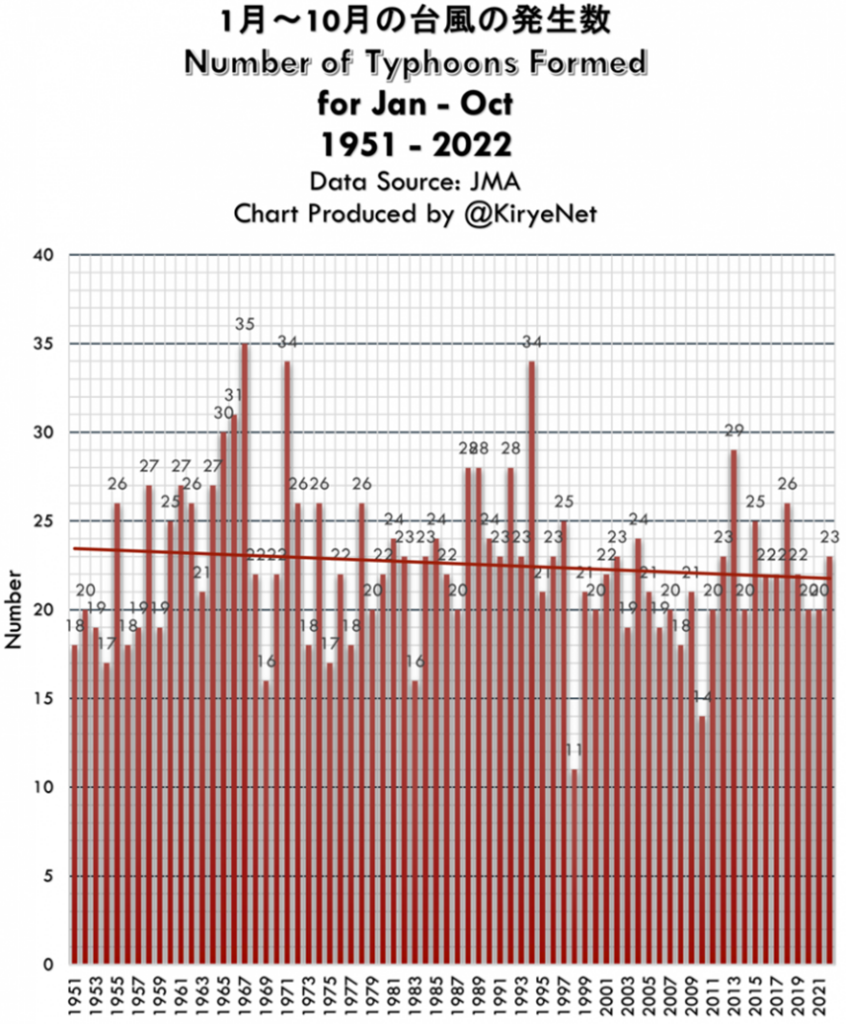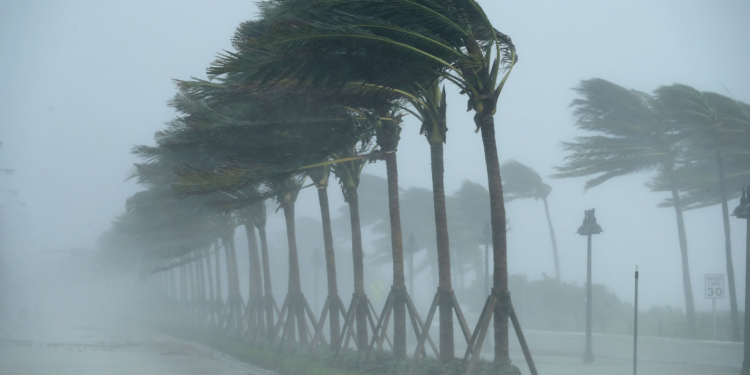The 2022 North Atlantic hurricane season is drawing to a close, and all the evidence shows it is below average in the number of storms and overall ferocity. Unsurprisingly, the climate catastrophists have again been proved wrong in their forecasts. In May, the U.K. Met Office said the season was “most likely” to be above average. “What is interesting this year is that the forecasts issued by many different agencies are all indicating an above-average season. As they are all pointing in the same direction, this gives us a higher degree of confidence,” noted Julian Heming, said to be the Met Office’s expert on tropical cyclones.
The Met Office forecast 18 named tropical storms and four major hurricanes. According to data collected by tropical scientist Phil Klotzbach of Colorado State University and quoted by Professor Roger Pielke, in 2022 there were 14 tropical storms and two major hurricanes. In an article headed “The 2022 Seasonal Hurricane Forecast Bust”, Prof. Pielke references the work of the Barcelona Supercomputing Centre that collected work from 29 organisations, “which allows a detailed analysis of just how wrong the community was in 2022”. Of the 19 organisations that issued forecasts last spring, 17 of them predicted an above-average frequency of ‘named storms’. By early summer, all 19 of these forecasts predicted an above-average season. Yet, according to Pielke, on most metrics the hurricane season was below average.
It’s only a climate model forecast, it might be said. But of course, in a political world where the weather is catastrophised on a daily basis, these predictions play an important part in promoting the command-and-control Net Zero agenda.
Earlier this year, the mainstream media were full of these groupthink reports forecasting a bad hurricane season. Inevitably, the finger was pointed at the suggestion that humans were responsible for the catastrophic weather events. Never slow to jump on a catastrophe bandwagon, the BBC reported the early forecasts, noting: “With another active season expected, many might question whether climate change has had a hand in this.”
The latest hurricane news caps a bad year for climate catastrophists. When it comes to making generalisations from single events, those who live by the sword, die by it as well. Arctic sea ice has shown impressive recent growth, with suggestions that the Greenland ice sheet might even have grown in the year to August 2022. Coral at the Great Barrier Reef is back in record amounts, while a little extra summer warmth in the Arctic has led to more food being available for all forms of life including growing numbers of seals and polar bears. The wildfire season is ending in the western United States, and it has been one of the quietest for years. If you like a little cold in your weather mix, you would have welcomed the news that in 2020-21 the South Pole recorded its coldest six month winter since records began. And the latest news from Antarctica is also on the chilly side, with the South Pole and the eastern station at Vostok recording their coldest November for 35 years.
How much of this have you seen reported in the green agenda-driven mainstream media?
The U.S. Weather Channel notes that none of the 2022 hurricane figures stand out, given that the entire hurricane name list was used up in 2021, and 2020 had more than double the storms of 2022. It was noted, of course, that the luck ran out for Florida in late September when hurricane Ian made landfall. The hurricane caused enormous damage across the State and over 100 lives were lost. Eastern Canada was also hit by a powerful storm around the same time.
Hurricanes can produce ferocious amounts of localised power, but the 2022 season was notable for a significant reduction in the total energy generated. According to Phil Klotzbach’s work at Colorado State, the ACE index was about 22% below average. ACE (Accumulated Cyclone Energy) compiles data on the number of storms, their intensity and how long they last. Klotzbach noted that for the first time in 25 years, and only the third time since 1950, no storms formed in the Atlantic basin in August. Measured by ACE, it was said to be the least active hurricane season through to the end of August since 1988.
Meanwhile, over in Asia the latest figures for Pacific typhoons are said to show a continuing downward trend. Reporting on the latest figures from the Japanese Meteorological Agency (JMA), the climate science site No Tricks Zone says alarmist are “baffled” and “embarrassed”.

No Tricks Zone goes further and charges that the media have been misleading and lazy for not calling the alarmists out. “Pacific typhoons are not becoming more frequent. If anything, the warming has led to less typhoons, which is good news which the alarmists unfortunately are unable to swallow,” it concludes.
Don’t hold the Front Page.
Chris Morrison is the Daily Sceptic’s Environment Editor.












To join in with the discussion please make a donation to The Daily Sceptic.
Profanity and abuse will be removed and may lead to a permanent ban.
The warmists must be very annoyed there have been no major hurricanes for years. Just look at the cost of windstorm reinsurance – it has been low for years.
August – peak hurricane month – had zero hurricanes, first time since God was in short trousers.
Of course, that’s just another sign of climate change.
Oh dear, what an absolute Pfisser.
Never mind, we can always double down for next year…
The media make a fuss over the forecasts but ignore the uncooperative reality.
‘a little extra summer warmth in the Arctic’ and ‘If anything, the warming has led to less typhoons’. I’m not clear whether the author does not believe warming to be taking place, or believes it to be taking place but not causing additional typhoons.
A warmer world is a calmer world. The world has warmed since the Little Ice Age, and storminess has reduced.
There will be a few, but nobody sane and intelligent believes no warming is taking place – it has been doing so for 10 000 years and has happened many past times in Earths 4 billion year history, in between periods of cooling.
What is beyond dispute, from the evidence from observation, is the warming is so slight it is unmeasurable and there is no observable change in the Earth’s climate system beyond natural variability.
That being so, it is moot whether or how much (nobody can show any data) Mankind is contributing to the warming. And by the way, it is impossible to measure warming to more than a few degrees of accuracy, since the so-called global average is derived from a wide range of instruments of different degrees of accuracy and not calibrated against a single reference instrument. And being an average it does not exist, with 50% of measurements above, 50% below.
The alleged rate of global warming is a fabrication using computer modelling and algorithms to torture the raw data to give a number to tenths and hundredths of a degree – an output with an accuracy greater than the input – that fits the ‘narrative’. So in fact meaningless nonsense.
I hope that’s cleared things up for you.
PeOpLe ArE dyInG In hurRIcAnES!
And car accidents. What has that to do with anything?
We notice now that Prince Wiliam has taken up the Climate Change stuff now since his Father became King. Such an easy job though isn’t it? Nothing you say has to be true. Nothing you say has to be based on any evidence? And you are backed up by 95% of the media who report everything you say as some kind of ultimate truth. This morning as I am typing this, I see a reporter on GB NEWS saying that Prince William is doing something about the “Climate Crisis”.————– I am sorry but when even GB NEWS are using this political terminology then what chance is there for the public to get impartial information? “Climate Crisis” is not scientific language. It is political language, and GB NEWS must STOP doing this. ———–To be fair this is not what they do all the time as many such as Mark Steyn, Bev Turner and Farage etc will call out this junk science for what it is
Prince William would be better occupied doing something about the energy crisis wholly caused by his father’s Government.
I’m pretty sure you’ll find that climate change has caused the reduction. After all, it causes everything else
The only conclusion that can be drawn is the carbon taxes in Canada are working. Implementing a carbon tax in US would probably eliminate all hurricanes completely and might even flatten tropical storms.
And that is going to be the next phase:
“Storms are less frequent because greta the climate troll is still snarling at politicians”
“The Arctic ice sheet is expanding because of the efforts of all those cobalt-mining child slaves helping to make wind turbines and EVs”
“The Great Barrier Reef is at its most extensive coverage because of all those private planes flying into COP conferences”
“WE MUST DO MORE OF THIS”
BBC: “many might question whether climate change has had a hand in this.”
While the rest of of us, who have enough brain cells to form a synapse, roll their eyes and wonder why the missus wants to keep paying the licence fee
Now we will see the climate catastrophists collaborating on a plausible narrative to tell us why this quieter series of data is evidence of AGW and necessitates an acceleration in Net Zero targets to remove more of our freedoms and empower governments and corporations to have more control over our lives generally.
Just recently that unusual period of high temperatures and drought because of climate change, caused the river down the road to burst its banks.
An amateur meteorologist in North London has just recorded the 4th heaviest month of rain in 15 years.
We are regressing to the mean and nature is balancing itself as James Lovelock would say.